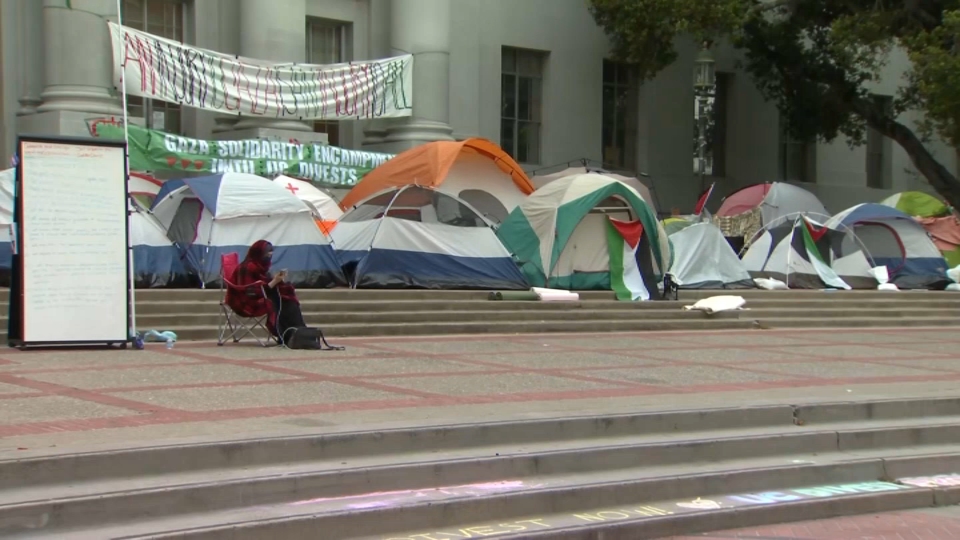Three Bay Area military veterans struggling with serious mental health issues have filed a federal lawsuit accusing their former Veterans Affairs (VA) psychiatrist of serious ethical and legal lapses, including sexual abuse, dosing an unwitting patient with a potent psychedelic drug, and using astrology to inform therapeutic decisions.
In their darkest emotional hours – coping with major trauma experienced both in and outside of the military – the veterans say they turned to VA psychiatrist Dr. Ferda Sakman for help. Instead, she left new scars, they say in the lawsuit.
“I was desperately seeking help,” said former Army medic Chris Park, who says he often drinks from the time he wakes up until blacking out at night and doesn’t like to stray far from his San Jose neighborhood.
“Biologically, I’m alive. But I’m not, you understand? It’s like a walking zombie is pretty much the way I can describe it.”
Get a weekly recap of the latest San Francisco Bay Area housing news. Sign up for NBC Bay Area’s Housing Deconstructed newsletter.
Park told NBC Bay Area’s Investigative Unit that he went to San Jose VA clinic in February 2019 seeking help for his mental health issues and to improve the quality of his life.
Felicia Dodge, a former Navy Master-at-Arms, wound up at the same clinic in November 2018, on the heels of a mental health hospitalization. Both veterans came under the care of Dr. Sakman.
“She became my full-time psychiatrist,” Dodge said. “Initially, I thought she was caring and empathetic.”
Local
But soon, both veterans say Dr. Sakman’s treatment practices turned bizarre.
“She took me off my medication at a crucial time when I was in intense trauma therapy,” Dodge said. According to the lawsuit, Dr. Sakman told Dodge she made the decision because “the universe” told her she was cured.
Dodge says her mental health deteriorated as a result. She also alleges in the lawsuit that Dr. Sakman routinely turned to astrology to make serious therapeutic decisions.
“She comes back with an astrological map and she maps my life into this map,” Dodge said. “She’s telling me, you know, ‘Chiron is right here, and the moon and stars align right here, so this is why your life is messed up right here,’ you know?”
“She really pushed her feelings and thoughts onto me to where I learned not to trust myself anymore,” Dodge said.
Park’s ordeal with Dr. Sakman turned even more strange, according to the allegations in the lawsuit.
Dr. Sakman, the lawsuit alleges, told Park he wasn’t an alcoholic and pushed him to drink when she took him to lunch at a local sushi restaurant. Park said the therapist told him it was part of his “exposure therapy.”
“Then my drinking, of course, flared back up,” Park said. “After the sushi and drinking, either that day or the day afterwards, she invited me to her house.”
After that lunch, the therapist took him back to her house to have sex, according to the lawsuit.
“She wanted to have an intimate relationship at that point,” said Park, adding that Dr. Sakman reassured him everything was fine when he raised concerns about doctor-patient boundaries.
In California, it’s against the law for a therapist to have sex with a patient, and it’s universally considered a major ethical lapse. Park and Dodge are joined by a third plaintiff in the lawsuit – a Marine Corps veteran named Daniel Pere – who says in court filings that Dr. Sakman asked if he thought about her in the shower and told him she knew he wanted to have sex with her.
“You need to vet the doctors for the vets,” said John Winer, the plaintiffs’ attorney. “If anybody in the administration was paying any kind of attention, there is no way that this whole situation could have happened. There is no way.”
In Park’s case, the lawsuit alleges the therapist went even further than sexual abuse, giving him hallucinogenic drugs while she took the same drugs herself.
“When you are hallucinating, when you’re tripping, you don’t have any judgement,” Winer said.
According to the lawsuit and Park’s account of the event, Dr. Sakman slipped the potent psychedelic drug Ayahuasca into his tea one night when he was at her house.
“She started freaking out,” Park said. “She just kept telling me to get out of [her house] and calling me names.”
Park says he experienced visual and auditory hallucinations, as well as flashbacks to traumatic events in his past.
“I started getting a lot of really horrible flashbacks,” Park said. “It was so bad it started going back to traumas that I had as a child.”
Although there are ongoing studies about the potential therapeutic benefits of psychedelic drugs – some of which show great promise, according to researchers – it’s currently illegal for therapists to prescribe them to patients.
“There is a great deal of interest in psychedelics – really, worldwide – as potential sources of novel therapeutics for psychiatric disorders that have been difficult to treat,” said Dr. Jerry Rosenbaum, professor of psychiatry at Harvard Medical School and Director of the Center for the Neuroscience of Psychedelics at Massachusetts General Hospital.
"It's likely that these psychedelics work through a number of different mechanisms. The one that I think is most clearly established is that they robustly induced the phenomenon neuroplasticity, which is encouraging the neurons in your brain to flourish to make new connections and form new synapses.”
Dr. Rosenbaum couldn’t comment on the specifics of this case, but said any therapeutic use of psychedelics should be done in a controlled environment, with extensive preparation and close supervision.
“It is a concern that a person is vulnerable during the psychedelic experience and more easily influenced,” said Dr. Rosenbaum. “And so, you do want the experience to be done in a safe setting with individuals that know what they're doing and can be trusted.”
Dr. Sakman’s attorney declined an interview request on her behalf. The VA also turned down an interview request from NBC Bay Area, but sent a statement saying:
“The safety of our Veterans and staff is a top priority at VA Palo Alto Health Care System. VA condemns this type of behavior in the strongest possible terms and this individual no longer works for VA. The case was investigated and referred to the appropriate oversight bodies, including the VA Office of Inspector General and the medical licensing board.”
Dr. Sakman had two stints working at the VA, according to the agency. She first worked there for two years between 2014 and 2016, and later from December 2018 to March 2020.
The circumstances of her departure from the VA are unclear. However, the New York State Board for Professional Medical Conduct, where Dr. Sakman held her license, later charged the therapist with negligence, saying her “contact with, and care of, a male patient was contrary to accepted standards of medicine” and that she “failed to adhere to professional boundaries.”
Dr. Sakman did not contest the medical board's charges and surrendered her medical license in 2020, according to state records.
She’s not the only Palo Alto VA doctor to be accused of sexual abuse in recent years. Earlier this month, a cardiologist at the facility pleaded guilty to one count of felony sexual contact for groping a subordinate and making repeated unwanted sexual advances.
A December Government Accountability Office (GAO) report also exposed issues with how the agency monitors doctors who contract with the agency through its “community care program.” The investigation found the agency had contracts with more than 1,600 doctors who were either “deceased, ineligible to work for the federal government, or had revoked or suspended medical licenses.”
Park and Dodge say they never received the follow-up care they needed to heal, and they want to see the VA held accountable.
“It was the aftermath of what happened after this came to light at the VA is what is so disappointing,” Park said.
Park says he’s in a dark place. He can’t sleep, he says, and drinks more than before. Dodge also said she’s struggling to come to grips with what happened. “I don’t trust anybody,” Dodge said. “I don’t trust myself. I can’t go to the VA without feeling like I’m going to have a panic attack.”



